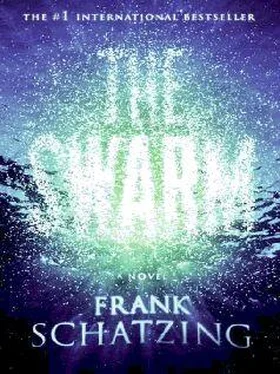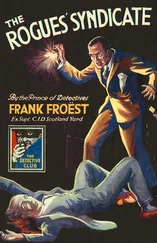Anawak approached the rudder from the other side.
At first he could see only raised edges and irregular hollows. Then it hit him. The rudder was encrusted with black-and-white mussels. He swam closer for a better look. At the bottom of the rudder, where the plate swept the shaft, the mussels had been ground to pieces. A thick gritty paste filled the cracks and grooves. No wonder it wouldn't respond. It was clogged.
He swam further down the hull. The mussels continued. He reached out gingerly to touch the shells. They were glued to each other in layers, small molluscs no more than three centimetres long. Very carefully, to avoid cutting himself on the edges, he pulled at the mussels until some came loose. They were half open. The fibres that had anchored them in position now poked out of the shells, like tendrils. Anawak stowed them in one of his collection bags, and racked his brains.
His knowledge of molluscs was sketchy. A number of species had a similar-looking byssus, composed of adhesive fibres secreted by the foot. The best known and most feared were the zebra mussels that had been brought over from Asia. In recent years they had colonised the ecosystems of Europe and America, destroying native fauna. If the mussels that had infested the Barrier Queen were zebras, it would explain why there were so many of them. They could establish themselves in no time, spreading at an alarming rate.
Anawak prodded the creatures with his finger. So, the rudder had been invaded by zebra mussels. It seemed the only explanation. But how? They usually preferred a fresh-water habitat. They could survive and reproduce in salt water, but that didn't explain how they could overrun a moving vessel miles from the seabed in the middle of nowhere. Had they latched on to it before it set sail?
The freighter had been en route from Japan. Did Japan have a problem with zebra mussels?
Further down the stern, two curved blades loomed up like ghostly apparitions from the murk below. Anawak swam towards them, kicking his fins until he could grip the edge of one. The propeller measured four and a half metres in diameter. Eight tonnes of solid steel. For a moment he imagined what it would be like when it was turning at full speed. It seemed impossible that anything could so much as scratch it without being shredded.
Yet the propeller was covered with mussels.
An unpleasant possibility occurred to Anawak. Hanging off the edge of the blade, he swung himself hand over hand towards the middle of the propeller. His fingers touched something slippery. Gobbets of a light-coloured substance slid off and floated towards him. He snatched at them, caught one and peered at it.
It was jelly-like, rubbery, and looked like animal tissue.
He stashed it in a collection jar, and felt his way forward. One of the divers appeared on the far side, lamp shining on his mask, making him look oddly alien. He signalled for Anawak to follow. Anawak glided between the rudder shaft and the propeller. He stopped and let himself sink through the water until his fins touched the propeller shaft. A film of slime coated it. The divers were trying to tear it off and Anawak joined in, but they were wasting their energy. It had wrapped itself round the propeller and, without proper tools, they couldn't pull it off.
Anawak thought back to what Roberts had told him. The whales had tried to get rid of the tugs. It was absurd. Why would they sabotage a tow line? So that the freighter would sink? In rougher conditions she might easily have gone under – after all, she was effectively disabled. The sea wouldn't have stayed calm forever. Had the whales been trying to stop her reaching safe water before the weather changed?
He glanced at his gauge. Still plenty of oxygen. He signalled to the divers that he wanted to inspect the hull, and the three left the propeller, fanning out along the side of the vessel, with Anawak at the bottom, where the hull curved round to the keel. The beam of his head-torch explored the steel casing. The paint looked relatively new, with few scratches and little discoloration. He dropped down towards the seabed, further into the gloom. His eyes darted back to the surface: two hazy spots of light marked the position of the divers inspecting the hull. There was nothing to worry about. He knew where he was. All the same he had a heavy feeling in his chest. He kicked his fins a few times and drifted along the hull. No sign of any damage.
All of a sudden his head-torch dimmed. Anawak's hand flew up to check it – but the problem wasn't the lamp: it was where the lamp was shining. Further up, the beam had reflected evenly. Now it was swallowed by a bed of jagged mussels, whose dark outline obscured the painted stern.
How had they got there?
For a moment Anawak considered swimming back to the others, then decided against it and continued down the hull. As he neared the keel the laver of mussels thickened. If the rest of the underside was covered to that extent, a significant weight had accumulated. But someone must have noticed the state the ship was in. On the high seas a load like that would slow a freighter noticeably.
He reached the point where he was obliged to swim on his back. A few metres beneath him lay the muddy wasteland of the harbour floor. He could barely see anything, the water was so murky – just the huge mound of mussels above him. Kicking rapidly with his fins he swam towards the bow. Suddenly the bed of mussels stopped as abruptly as it had begun. For the first time he realised the true size of the outcrop. The mussels had formed a layer two metres thick along the bottom of the Barrier Queen .
There was a chink at the edge of the outcrop. Anawak hovered in front of it. Then he reached down to his ankle, where his knife was in its sheath. He pulled it out and plunged it into the shells.
The outer crust split open and something shot out towards him, twitching frantically. It collided with his face, almost pulling off his breathing apparatus. Anawak jerked backwards. His head hit the bottom of the boat. A harsh light exploded in his eyes. He wanted to get out of the water straight away, but the keel was above him. Kicking desperately, he swivelled round and was confronted by another mound of shells. Their edges seemed to be stuck to the hull with a jelly-like substance. Forcing himself to calm down, he set about hunting among the floating particles for traces of the thing that had attacked him.
It was gone. All he could see were strange formations of mussels.
Suddenly he realised he was clutching something. It was his knife. A scrap of something dangled from the blade – a blob of milky-coloured, semi-transparent material. Anawak stowed it in the collection jar with the tissue. He couldn't wait to get out of there. His heart was pounding, so he ascended slowly, with small, controlled movements, following the hull upwards until the lights of the two divers appeared in the distance. He headed towards them. They'd found the mussels too. One was using his knife to prise individual shells away from the crust. Anawak tensed, steeling himself for something to hurtle towards them, but nothing happened.
The second diver motioned upwards with his thumb and they ascended slowly to the surface. Gradually the light grew stronger, but the water remained murky.
At last Anawak found himself blinking in the sunshine. He pulled off his mask, and breathed in gratefully.
Roberts and the others were waiting on the jetty.
'So, what does it look like down there?' Roberts asked. 'Did you find anything?'
Anawak coughed and spat out a mouthful of harbour water. 'You could say that.'
THEY WERE STANDING AROUND the tailgate of the truck. Anawak had been nominated as spokesman.
'The rudder was blocked with mussels ?' asked Roberts, incredulously.
Читать дальше












